
How to build an E-E-A-T strategy for local SEO
While many SEO practitioners will smirk at the term “E-E-A-T” and immediately the
ink about what’s for lunch, they aren’t necessarily wrong.
To achieve E-E-A-T, various crucial “ingredients” must seamlessly come together and result in quality.
This article explores how to incorporate local SEO tactics into an E-E-A-T strategy.
So what is E-E-A-T?
SEO practitioners laud E-E-A-T as the cornerstone of long-term organic growth. Developed as part of Google’s search quality rater guidelines, E-E-A-T stands for experience, expertise, authoritativeness, and trustworthiness.
Whenever a Google algorithm rolls out, Google’s recommendations fall back on E-E-A-T factors without fail:
“Google’s automated systems are designed to use many different factors to rank great content. After identifying relevant content, our systems aim to prioritize those that seem most helpful. To do this, they identify a mix of factors that can help determine which content demonstrates aspects of experience, expertise, authoritativeness, and trustworthiness, or what we call E-E-A-T.”
While Google’s statement here is fairly wordy, the key takeaway is crucial – Google’s automated systems look for E-E-A-T elements in online content.
Why does E-E-A-T matter for local SEO?
Several key local SEO tactics relate directly to E-E-A-T:
- Experience: Google Business Profile posting, local employees, customer photos.
- Expertise: Local service pages, blog posts.
- Authoritativeness: Local links.
- Trustworthiness: Local reviews.
An SEO practitioner will leverage a unique competitive advantage by incorporating these local tactics as part of a larger E-E-A-T strategy.
E-E-A-T wasn’t designed as a series of weights or ranking factors – it’s a singular emphasis on quality. By achieving a high-quality customer experience, a website is duly rewarded with high-impact rankings.
Here’s how each local SEO tactic can be incorporated into an E-E-A-T strategy.
Experience: How are you doing?
As the newest factor of E-E-A-T, experience emphasizes the customer’s perspective.
Sometimes, a user wants to hear from others who have used the product or service rather than reading content from a licensed professional.
So, how can a local business make the customer experience more accessible?
- Local reviews
- Google Business Profile posting
- Employee bios
- Customer photos
Local reviews
Local reviews overlap significantly with trust (the most important factor of E-E-A-T) and are primarily covered within that section of this article.
But a business’s reputation is vital to a consumer’s decision-making process.
Google Business Profile posting
By regularly posting on Google Business Profile (GBP), an organization connects directly with users who want to understand the company’s day-to-day culture.
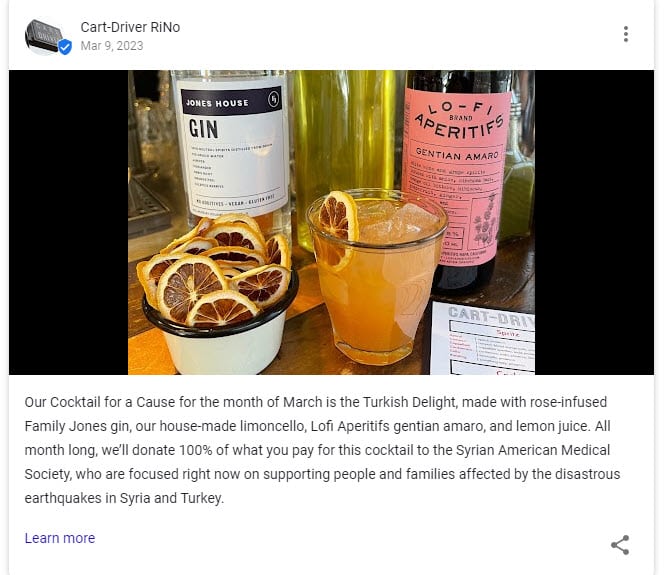
Customers can more readily grasp their potential experience with a business when they see what’s going on behind the scenes.
Posting regularly on GBP might not be a direct ranking factor, but it establishes a human element.
Employee bios
When users are looking for a service, they want to know about the human beings who will provide that service. Employee bios contribute to a culture of transparency and communication.
Do people care more about Acme Plumbing, the company, or Doug, the plumber with two kids and a passion for sump pumps?
By learning about the team, the user can envision their potential experience. Employee information should be accessible to users – either posted on GBP or placed directly on location pages.
Customer photos
A culture of documentation means there is nothing to hide. An organization should share imagery that accurately represents the customer’s experience.
By asking users for permission to repost their images and reviews, an organization takes ownership of its value in a local community.
For example, a local renovation company might include an “Examples of our work” section with “before” and “after” pictures on its website.
Experience can’t be simulated
Users care about their experience when choosing an organization. They want to know they’ll receive quality products or services without hassle.
Show the local community that your business values its customer experience with live, unpolished representations of that experience.
Expertise: Why are you qualified?
An organization brings value to its community when its employees have extensive backgrounds and skill sets.
Google recently emphasized the importance of expertise for users when it added several new features to search results, including "About this author," "Perspectives," and more prominence for "About this page":
"As we surface new voices and perspectives, we want to ensure that people can easily learn more about the authors behind the content they are reading and discover new voices they can trust."
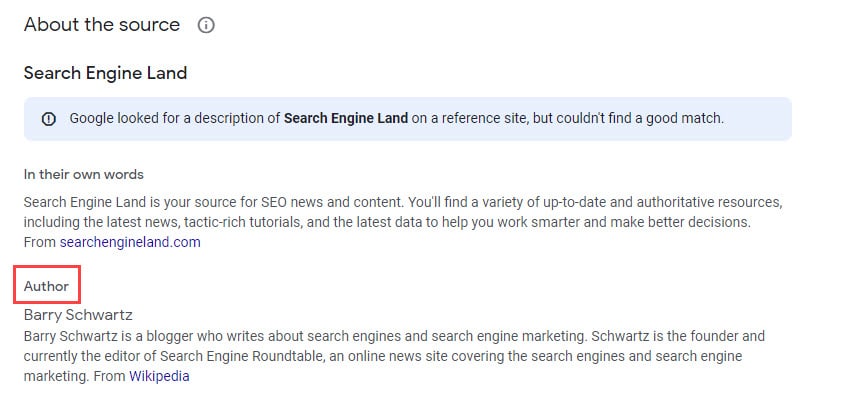
An organization leverages its expertise through its content, particularly:
- Local service pages.
- Blog posts.
Local service pages
Location pages are a commonly used local SEO tactic, but they often don't offer enough content to rank. A single location page doesn't have space to go into depth about its products or services.
With local service pages, a website builds upon its local expertise by offering detailed information about its services to a specific community.
Substantial content about a local service proactively shows the user and the search engine that the business is knowledgeable.
If a dentistry center has opened six locations across the Houston area and wants to rank for "cosmetic dentistry," a single location page might not cut it.
By publishing a service page for specific suburbs like Sugar Land and Katy, the dentistry practice further emphasizes its expertise.

Other examples of informative content on local service pages include a troubleshooting section, a resources section linking to blog posts and customer testimonials specific to that service.
Blog posts
Many local websites have a blog. Few of them connect their blog's editorial calendar with the customer experience.
- What is the customer team receiving complaints about?
- What information would educate and empower the customer?
- What topics are rarely covered by other local blogs?
A local criminal defense lawyer might write a commonly published piece of content "when you need a criminal defense lawyer," but is this accomplishing anything?
Search results for this keyword will be highly competitive.
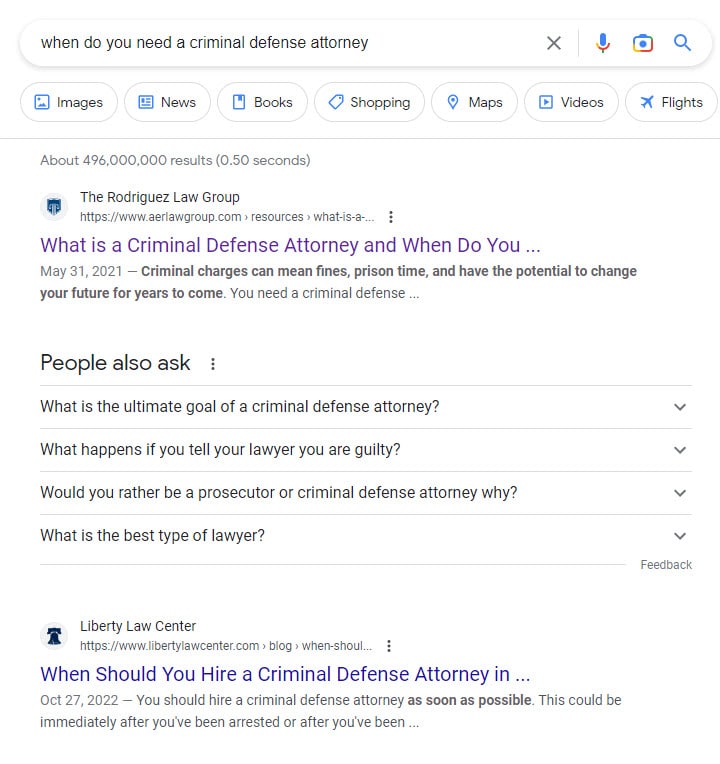
What's a more specific situation that hasn't been written about?
For example, if your location recently faced a national disaster, did people break into local buildings for shelter or to help each other? Was there tension with the law in that scenario?
Providing general information about how to approach those legal troubles might attract local attention and rankings.
A blog post only builds expertise if it's relevant to the customer. It should be well-researched, localized, easy to read, and backed by an author with expertise.
Look beyond keyword research into content opportunities that will make content stand out and provide thought leadership.
Expertise drives quality
A website's on-page SEO strategy should prioritize expertise above all other tactics.
Most websites have leveraged SEO elements like title tags, meta descriptions, and headings in a competitive marketing environment.
An organization will be awarded for its expertise when its content proactively addresses its user base.
Authoritativeness: What are you known for?
Authoritativeness is an earned concept – third-party entities must vet it.
A local business could publish the industry's most comprehensive and impactful content. But if nobody references that content, it doesn't matter.
As for authoritativeness, Google's rater guidelines advise raters to "consider the extent to which the content creator or the website is known as a go-to source for the topic."
The phrasing "is known as" emphasizes that others should have previously recognized the website.
An organization must be publicly recognized for its content, quality products/services, and local relevance to build authority around a target keyword.
In local SEO, several types of local links should be considered:
- Citations
- Community Involvement
- Knowledge Sharing
Citations
The most basic tier of authoritativeness relates to the consistency of a local business's name, address, and phone number (NAP consistency).
Have you ever tried to visit a business listed on Google Maps only to discover that its location is completely incorrect?
Accurate contact information is crucial to lead generation! Google's information is only as good as the online consensus.
When building online citations, a local business lists its basic information across dozens of websites.
Rather than relying on the website as a single resource for NAP, search engines can validate the information through multiple online listings.
Community involvement
Beyond validating its own existence through NAP consistency, a local business should amplify its relevance within the community.
It takes more than a Google Business Profile to become recognized for nearby quality products and services.
In my hometown of Fort Collins, CO, we have about 10 fried chicken restaurants (it's a trendy food!). But only one of these chicken restaurants regularly stands out in the community as the best.
Music City Hot Chicken is described by locals and travelers alike as the best fried chicken restaurant because:
- It's won awards.
- It regularly hosts community events.

Knowledge sharing
Local websites should not be limited to content around basic services, troubleshooting, or commonly asked questions – everyone is working on those types of content!
When competition is tight, innovation is one of the best ways to stand out.
- Can your organization use its expertise to conduct a local survey and publish that data?
- Is there an employee who transformed the industry landscape with new or innovative technology?
Local media outlets, industry publications, and social media users often recognize original data and innovation.
When links from trusted third-party organizations are achieved at scale, an organization's authoritativeness is amplified.
Authoritativeness drives recognition
From the simplicity of an address citation to the publicity of a news story, authoritativeness can only be accomplished through dedicated effort and skill.
Trust: Why are you the best?
Described by Google as the most important factor in E-E-A-T, trust is supported and upheld through the elements of experience, expertise, and authoritativeness.
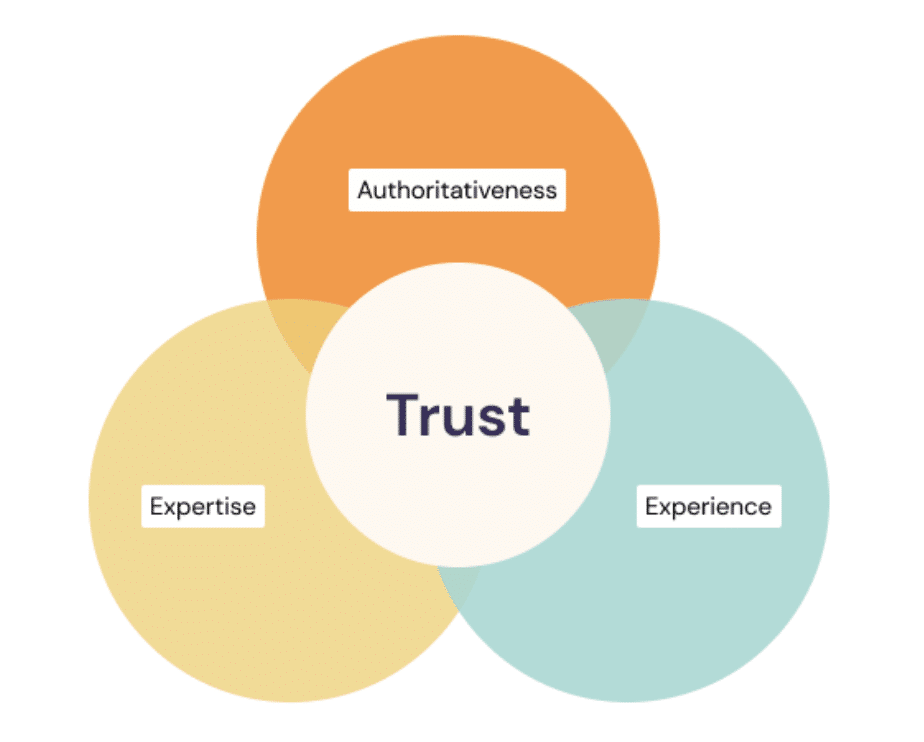
While the factors of E-E-A all speak to trust, one tactic stands above all others – reviews are the most important element of local E-E-A-T.
A mountain of evidence supports the value of reviews as a trust element:
- 98% of consumers researching local businesses will "occasionally" read online reviews
- 86% of consumers say that reviews are either "the most" or "somewhat" important factor when choosing a business
- Since 2015, the local SEO industry's perception of review signals as a ranking factor has increased by 100% (from 8% to 16%)
Local reviews can be classified into two categories:
- Third-party reviews
- GBP reviews
Third-party website reviews
While local SEO represents a wide variety of industries, some occupations encounter significant local demand and competition:
- Medical providers
- Home service providers
- Legal professionals
- Real estate
- Restaurants
Each of these providers is associated with specific local review websites. For example, people will review their experiences with local attorneys in Justia.
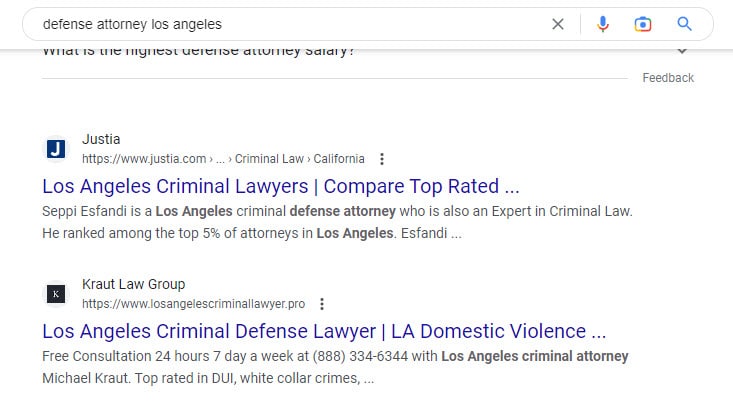
In most major local SEO verticals, reviews on Google Business Profile are no longer a sufficient Trust strategy. Additional effort must be applied to trade-specific review websites.
Google Business Profile reviews
Ah yes, GBP, the ubiquitous review space for all local businesses – the use of Google for reviews is up from 81% in 2021 to 87% in 2023.
If a business serves local customers, it probably has a GBP, which likely has reviews.
Getting users motivated to leave reviews is a significant challenge for local businesses.
Many resources are available to help organizations improve their local reviews, from hiring a reputation management company to promoting reviews with an email marketing strategy.
My primary recommendation with reviews is communicating their value across all levels of operation. Marketing materials, customer service, and day-to-day operations should all consider review generation.
Trust is invaluable
Google places trust above all other factors because its user base depends on reliable, high-quality search results.
Reviews are the difference between saying, "you can trust me," like some sketchy back-alley mobster, versus overhearing your mom tell another mom how proud they are of you for getting all As in the third grade.
Local E-E-A-T strategy is challenging but worth it
Individually, the pieces of local E-E-A-T are ineffective.
The journey to achieving E-E-A-T is similar to a notorious video game called "Dark Souls," in which players must overcome ridiculously hard puzzles and boss fights.
When people complain about the game's challenging nature, other players will respond with a single expression – "Git Gud" – which translates to…
Get good.
All E-E-A-T tactics consolidate into this singular expression.
People don't complete a video game by winning one boss fight, and a business doesn't get rankings from executing a single tactic.
It all comes together through months of effort, testing, and improvement.
E-E-A-T in local SEO is a compilation of multiple tactics into a larger strategy. It accomplishes growth for a business through its collective emphasis on quality and user experience.
If you want to improve your local E-E-A-T, prepare for a tough battle, but understand that your toils will make your victory that much sweeter.
The post How to build an E-E-A-T strategy for local SEO appeared first on Search Engine Land.
from Search Engine Land https://searchengineland.com/local-seo-e-e-a-t-strategy-395449
via free Seo Tools